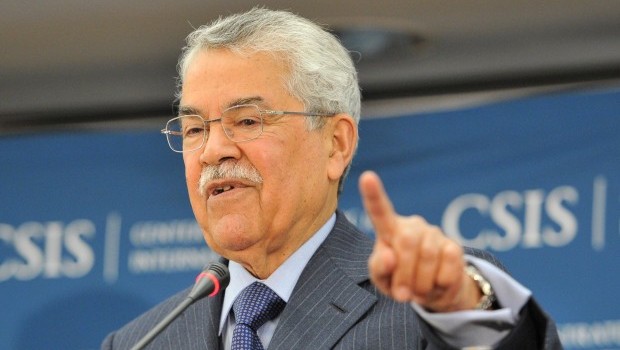
Saudi Arabian minister of petroleum and mineral resources Ali Ibrahim Al-Naimi addresses the audience during a lecture at the Center for Strategic and International Studies (CSIS) in Washington, D.C. on April 30, 2013. (AFP PHOTO/ Mladen ANTONOV)
Saudi Arabia produced record high volumes of crude in August as it boosted output for the second time in two years to cushion the global oil market from supply disruptions. Naimi’s comments come after producer group OPEC this week sought to reassure consumers there is sufficient supply to cover a plunge in Libya’s output.
“For the record, oil market fundamentals are good. The market is well balanced,” Naimi said at an industry event. “I repeat the message that Saudi Arabia is willing and capable for meeting any demand.”
Despite rising Saudi output, benchmark Brent crude prices spiked above USD 117 a barrel in late August on the virtual shutdown of Libyan oil output and the prospect of US military action against Syria.
Brent traded at USD 111.67 on Thursday, after falling this week as the threat of a US strike receded, but the market remains volatile on concern diplomatic efforts to avoid military action might fail.
Speculation about international political events is driving oil prices rather than any shortage in supply, Naimi said on Thursday.
“Our [OPEC] production last month was almost the same as a month before, only 100,000 barrels a day shortage. There is no effect whatsoever. . . . We won’t see a crisis,” said Abdullah al-Badri, the secretary general of the Organization of the Petroleum Exporting Countries.
Saudi Arabia pumped a record 10.19 million barrels per day in August, an industry source told Reuters.
Rising supply from Saudi helped offset losses from other OPEC members. OPEC output in August fell around 124,000 barrels per day (bpd) on the month to 30.23 million bpd, but the group said in its monthly report this week that the market was well supplied.
The US Energy Department expressed similar sentiments on supply, but noted that unplanned outages from OPEC members had reached 2.1 million bpd in August, the highest level recorded since it started tracking outages in January 2009.
Protests at oilfields and terminals in Libya saw output slump to a post-war low of just 150,000 bpd in early September, down from 1.4 million bpd earlier this year.
Badri said oil producers would boost supply if they did see any shortage, but said there was no need to pump more for now.
“If we see there is a shortage in the market, we will act. That’s how we do business,” he told reporters at the same event in Seoul. “The market is very well supplied, we don’t see a shortage.”
Badri, himself from Libya, said he hoped the Libyan government would move swiftly to boost supply.
Libya’s attorney general has issued arrest warrants for the leaders of oil strikers and will act soon against protesters, the country’s prime minister said on Wednesday.
